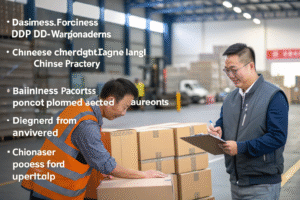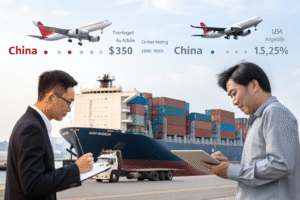When your cargo gets delayed, damaged, or lost mid-transit, it can feel like a punch in the gut—eating into your profits and rattling customer trust. Many importers find freight claims to be a maze of endless forms, slow responses, and back-and-forth finger-pointing with carriers.
Freight forwarders cut through the mess by collecting airtight documents, talking directly to carriers, and walking clients through every step to lock in compensation faster. They’re not just middlemen here—they’re troubleshooters who fight for fair outcomes.
If you want to stop freight claims from draining your time and patience, it pays to know how forwarders handle them like pros.
What is the role of freight forwarders in claims?
Freight forwarders aren’t just paper-pushers—they act as claim advocates. Most importers don’t have the bandwidth to spar with shipping lines or insurance reps, so forwarders jump in to take that fight off their plate.
They pull together the right files, file the claim, chase carriers for updates, and keep pushing until the client gets what’s owed. Instead of letting paperwork drag you down, they streamline the whole ordeal and keep things moving.

How do freight forwarders gather claim documents?
They pull shipping invoices, inspection records, and bills of lading to build a rock-solid case. Many lean on International Chamber of Commerce practices and follow advice from TT Club Insurance to make sure nothing gets rejected.
Why is communication with carriers important?
Carriers are notorious for slow replies. Forwarders use their long-standing ties with airlines and shipping lines to push claims up the chain. Publications like BIMCO and The Maritime Executive show that sharp, professional negotiations can shave weeks off the process.
How do freight forwarders speed up the claims process?
Ask any importer, and they’ll tell you freight claims drag on forever. Forwarders, though, have tricks to cut down the wait.
They fast-track claims by using digital systems, submitting complete files upfront, and keeping the heat on carriers with regular follow-ups. Their insider knowledge of weak spots in the system means fewer hold-ups.

Can digital platforms make claims faster?
Absolutely. Forwarders increasingly lean on cloud tools like CargoWise and Descartes Systems that let them file, track, and update claims in real-time. That means fewer errors and zero chasing down missing forms.
How do forwarders avoid paperwork delays?
They file everything complete the first time—no gaps, no missing attachments—so claims don’t bounce back. Articles from Freightwaves and InBound Logistics stress that accuracy upfront can slice weeks off processing times.
Do freight forwarders help with insurance claims?
Insurance can be a headache for importers, but freight forwarders know the playbook.
They step in to explain what’s covered, prep loss reports, and even work directly with insurers to keep payouts from dragging on. Many forwarders partner with insurers, which helps grease the wheels on settlements.

How do forwarders support insurance claims?
They confirm coverage, prepare loss assessments, and liaise with insurers to push claims through. Global players like Lloyd’s of London and Allianz Global Corporate & Specialty outline exactly how cargo policies handle claims.
Why should importers rely on forwarders for insurance?
Because forwarders sit at the crossroads of logistics and insurance—they know both sides. That dual expertise saves importers from costly mistakes, as highlighted by Marsh Insurance and Risk Management Magazine.
Why does efficient claims handling build long-term trust?
Claims are stressful, but if handled right, they can actually build loyalty.
When forwarders nail the claims process, they prove reliability and win long-term trust. They stop being just a vendor and become a partner importers lean on.

How do forwarders boost client confidence?
By standing in the gap when things go wrong, forwarders show they have their clients’ backs. Features from Supply Chain Digital and Transport Topics show that when a forwarder consistently handles claims, clients feel way more secure.
Why does efficient handling create loyalty?
Because importers never forget who fought for them when things went south. Studies in Logistics Management and Harvard Business Review prove that fast, fair claims handling is a key driver of long-term loyalty.
Conclusion
Freight claims don’t have to turn into drawn-out battles. With the right freight forwarder, they’re handled with speed, structure, and fairness. Forwarders collect the right evidence, use smart tech, push carriers, and work with insurers to lock in results. Importers who team up with reliable forwarders save time, cut stress, and build business relationships that last.









